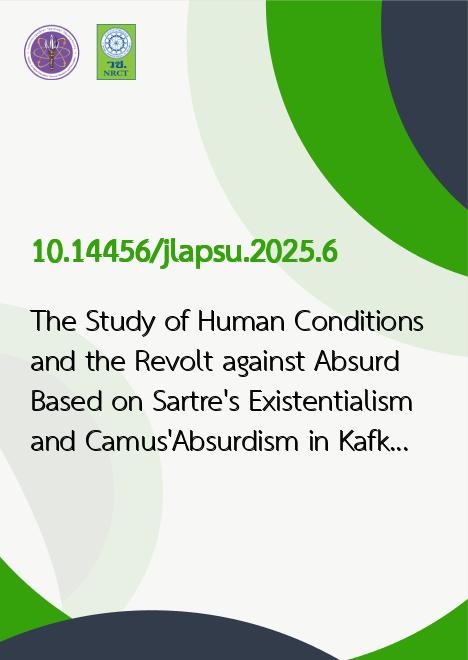
|
The Study of Human Conditions and the Revolt against Absurd Based on Sartre’s Existentialism and Camus’Absurdism in Kafka on the Shore |
|---|---|
| รหัสดีโอไอ | |
| Creator | Khanisara Sittivangkul |
| Title | The Study of Human Conditions and the Revolt against Absurd Based on Sartre’s Existentialism and Camus’Absurdism in Kafka on the Shore |
| Contributor | Panida Monyanont |
| Publisher | Faculty of Liberal Arts, Prince of Songkla University |
| Publication Year | 2568 |
| Journal Title | Journal of Liberal Arts, Prince of Songkla University |
| Journal Vol. | 17 |
| Journal No. | 1 |
| Page no. | 281681, pp.1-18 |
| Keyword | Absurdity, Absurdism, Existentialism, Sisyphus |
| URL Website | https://so03.tci-thaijo.org/index.php/journal-la/index |
| Website title | Journal of Liberal Arts, Prince of Songkla University |
| ISSN | 2651-1126 |
| Abstract | This study aims to bring the key philosophical concepts of two existentialists, which are Existentialism by Jean-Paul Sartre and Absurdism by Albert Camus, to analyze Kafka, the protagonist of Kafka on the Shore. It examines his life conditions and his decision to continue living, and interprets the key message derived from these philosophical ideas. The novel revolves around the journey of a runaway boy who tries to escape his Oedipal prophecy, only to find it is harder to avoid fulfilling it. His responsibility and anguish stemming from his choice drive him to the brink of suicide, but he ultimately finds his way back to living with hope. Sartre’s concept is used as it emphasizes human existence as inherently purposeless, with humans thrown into the world bearing the responsibility to fulfill their life with meaning. His explanation on various human conditions in his essay, Existentialism is a Humanism, is used to navigate Kafka’s life conditions, including his freedom of choice, self-deception, moral responsibility, alienation, and anguish. Since the novel does not end in tragedy, as is often the case with most existentialist works, Camus’ Absurdism is adopted to explain ways to confront life absurdities through revolt and acceptance. The results of this study could serve as a case study for character analysis to offer a deeper understanding of existentialism and absurdism in Kafka’s life. Camus uses of the Myth of Sisyphus as an inspiring story can also motivate humans to be resilient and persist with hope, the same way as Kafka does. |